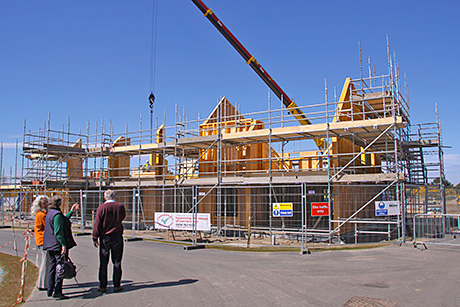The construction industry has the knowledge and experience to take a lead in reducing Scotland’s carbon emissions argues Alex Goodfellow

SPEAKING in advance of this month’s visit to Stewart Milne Timber Systems by energy minister Fergus Ewing, Goodfellow said the drive towards zero carbon homes would be best served through collaboration between Government and industry.
“In an industry which exists to design and create new structures, research and development is a key factor in delivering relevant and affordable solutions. The construction sector has the knowledge and practical expertise to lead the way with new innovations in building techniques, fabric and design to significantly reduce the carbon footprint of new homes. The aim to reduce over-all and can contribute significantly to reducing cost.”
Acknowledging some techniques used to improve energy efficiency can bring about additional costs, Goodfellow said: “Retrofitting homes and designing new builds with more efficient technology and heating systems as well as better loft insulation will go a long way towards improving energy usage in current housing stock. However, this action alone can only take us so far.

“The challenging financial climate is a key consideration for developers and local councils and the latest innovations in product development and building techniques, such as a ‘fabric first’ approach could see developers erect homes using only the most sustainable materials that can bring about significant financial savings and cash flow benefits as well as a reduction in carbon.”
Stewart Milne Timber Systems designs and manufactures timber systems for commercial and residential developments including homes, hospitals, student accommodation and hotels. Its Sigma II Build System has received a number of industry awards for its carbon efficiency – achieved through superior insulation and air tightness – ease of build and cost effectiveness.
Goodfellow went on: “Timber is one of the most sustainable building fabrics available and can bring about significant financial savings due to increased speed of build and lower material costs. For example a 40-unit housing development will save 10 percent of its costs if built with timber frames, and building on brownfield sites or commercial projects, where build programmes are critical, can deliver savings of up to 20 percent. A timber frame house can be constructed within nine weeks, compared to the 15 weeks a traditionally-built house needs.”
Innovation will remain critical he said. “We like pushing the boundaries and challenging ourselves to go that step further. It is a testing time for the industry and the onus is on all of us to find new ways of doing things which will not only provide high quality homes but home that consumers want to buy, that are also cost effective to build and support the country’s carbon reduction targets – innovation does that.”
Fergus Ewing commented: “The construction industry can help make sure that the homes we live in over the next century meet our needs in a way that is low in emissions and affordable.
“It is good to see companies like Stewart Milne taking a leading role in providing exemplar buildings as achieving sustainable and low carbon design in the first place is crucial.
“Retrofitting existing homes to reduce the energy needs of buildings will also play a key role, as the buildings we have now form the places we know and love, so will be around us for a long time yet.”
Stewart Milne has also just completed work on an exemplar eco-homes project in the north. Findhorn, in Moray, was designed by Glasgow’s John Gilbert Architects to showcase the latest developments in low energy construction and has attracted buyers from across Europe, Asia, Africa and North America. Milne’s timber systems operation provided a highly insulated timber system, incorporating floors and roofs, using local materials where possible to maximise sustainability and carbon efficiency throughout the build cycle and on to the end user.
Alex Goodfellow is group managing director at Stewart Milne Timber Systems.








